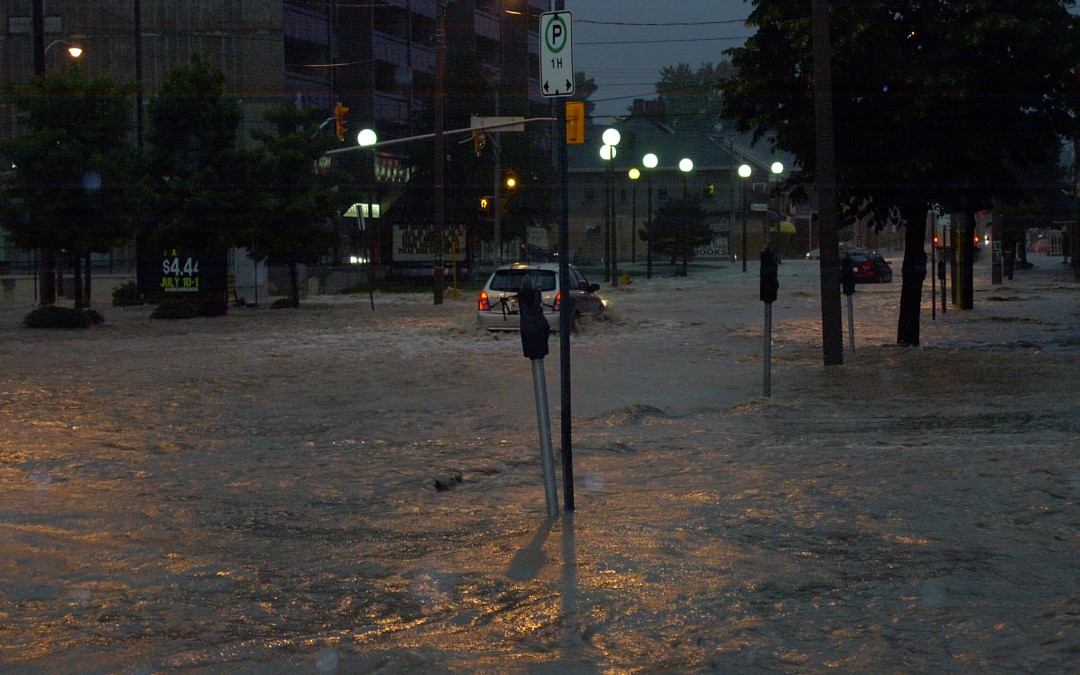Photo credit: City of Peterborough
When we talk about the need to prevent damage from flooding and manage our stormwater better, it’s important to remember that this isn’t just an abstract issue – the personal consequences of flooding are very real.
As part of our initiative to bring together stakeholders to create an action plan to address the issue of urban flooding in Ontario, we’ve been collecting stories of Ontarians who have been personally affected by flooding. Want to share your story? Do it via our Facebook group or our website.
We didn’t have to go very far – just in the Green Communities Canada office, which is based in Peterborough, several of our staff have first-hand experience. Sharyn Inward, Director of Water Programs at GCC, had to do major home renovations twice in three years following damage from flooding. She credits this experience with alerting her to the magnitude of the problem of stormwater runoff, which led her to develop the RAIN community engagement program which works to educate the public to take action to better manage stormwater.
Rose Bergeron, Depave Paradise program manager, while not flooded herself, helped her son’s childcare provider clean out their flooded basement, and saw the extent of the damages including appliances, carpets, and family photos.
Executive Director Clifford Maynes has also been flooded and has put in a lot of work to avoid future floods in his home, but still feels anxiety about it.
Peterborough filmmaker Brian Mitolo shared his story of losing expensive equipment, along with the work of local artists representing thousands of hours of work, when the basement offices of the Peterborough Arts Umbrella were inundated with water and sewage in 2004. The organization was not able to reopen for more than a year – at an above-ground location this time.
Alex Cullen lives in the Belltown neighbourhood of Ottawa, which was threatened by high water levels during the spring 2017. A raised bike path acting as a berm and the efforts of community members to sand bag the area largely protected Belltown from flooding, although water levels came very close to reaching above the 1 in 100 year flood plain, which would have flooded at least 80 homes in the neighbourhood.
Windsor faced severe flooding in 2016, and then again almost exactly a year later in August 2017. Paul De Ruyter, living in a condo in a neighbouring community to Windsor, was not flooded in his living area, although the basement rec room of the building was damaged in the 2016 flood. Following the first flood his insurance rates went up, but when he called his insurance company to ask about getting coverage for flood damage in his first floor unit, he was told that they wouldn’t provide it. He expects the problem to get worse.
Another Windsor resident, Joe DiStefano, has been flooded at least 10 times, nearly every single year since he has lived in his house in the Riverside neighbourhood. He spent over $4000 up front to disconnect his weeping tiles from the sewer system and install a sump pump and backwater valve this spring, expecting to get $2800 back from the City of Windsor’s basement flood protection program. The payment took months to process, and in the meantime he was flooded again during the August storm. The water in the street simply overwhelmed the plumbing – the sump pump discharge was “like peeing in a lake”. DiStefano says he plans to move in the spring, although he loves his home which is right across the street from where he works. He just doesn’t want to deal with the stress, both financial and emotional, of the frequent flooding. He’ll move to a home without a basement.
Despite all the efforts being put towards solving the problem, these stories are becoming more and more common. The Urban Flooding Collaborative is bringing together stakeholders to take a new, collective, approach to collaboration so that we can coordinate our efforts and work towards reducing the impacts of urban flooding in Ontario. Interested in getting involved? Visit our website to learn more, share your flooding story, or sign up for the collaborative.

